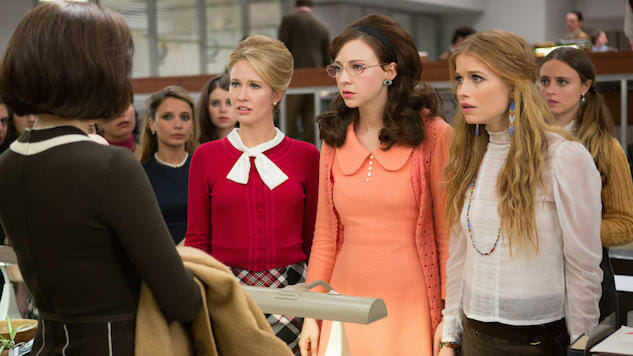The Real Revolution in Amazon’s Good Girls Revolt? The Journalistic One.
Amazon Studios
In Amazon’s airy, agreeable new series Good Girls Revolt, the Sixties breathe their last breath at Altamont Speedway, and none of top brass at News of the Week is close enough to the zeitgeist to notice. The fictional magazine, competitor of Time, may be “the first draft of history,” to quote editor at large Finn Woodhouse (Chris Diamantopoulous), but its focus on Fed chairmen and Army spokesmen reflects a penchant for the official line: Finn and his conservative colleague, national editor Wick McFadden (Jim Belushi)—their names apparently culled from some prep school annual, circa Catcher in the Rye—instinctively frame the violence at Altamont as a dispatch for the culture pages, not a feature for the color cover.
It falls to researcher Patti Robinson (Genevieve Angelson), fresh from a stint in San Francisco, to explain the angle—for her, 1969 marks the grim, belated end of the Summer of Love—and work her sources, to bring to bear a point of view that differs from the editors, and indeed from her contemporaries on the magazine’s all-male reporting staff. With the help of fellow researchers Jane Hollander (Anna Camp), Cindy Reston (Erin Darke), and Nora Ephron (Grace Gummer), Patti embarks for California to pin down an eyewitness, and phones in the scoop with a satisfied grin. Despite independent corroboration, however, Wick suggests that her source isn’t credible—because she’s a flower child, because she produces plaster casts of rock stars’ penises, because she’s not a man.
“These are man-on-the street interviews,” Patti points out, in tempo with the beating heart of Good Girls Revolt, and with its promised revolution. “Except they happen to be women with no clout.”
Though creator Dana Calvo’s series is, at first blush, a Mad Men-inspired portrait of working women in the era of the ERA, it’s here, amid the red pencil and hanging proofs of the newsroom, that Good Girls Revolt is at its sharpest, acknowledging that the change afoot as 1969 becomes 1970 is also an effect of perspective. In Wick’s knee-jerk reaction to Patti’s New Age source, or reporter Doug Rhodes’ (Hunter Parrish) blinkered approach to the Black Panthers, the series animates the argument for inclusion—then and now, in journalism and on TV—by emphasizing its influence on the narratives we consume; “I have to write it the way I see it,” Doug, a dashing white wunderkind, says to Patti of the Panthers piece, and of course that’s just the problem.
The series’ sense of the culture (and counterculture) is as broad as a barn—the first episode contains references to Easy Rider, anti-war protestors, the Hell’s Angels, Buffalo Springfield, and Mark Rothko, as if the writers pilfered their research from a fourth grader’s class project—and its style is rather insipid when set alongside contemporaneous period pieces, including Mad Men and Masters of Sex. To its discredit, Good Girls Revolt invites the comparison. Down to its recycling of Peggy Lee’s “Is That All There Is?” the series suggests what success might’ve looked like for ‘60s-set network copycats Pan Am and The Playboy Club: Sometimes simplistic, even artless, but entertaining enough to see through to season’s end.